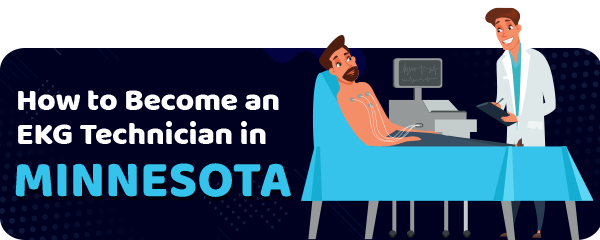If you work as an EKG Technician in Minnesota, you will record heart rhythms on paper, after you attach wire electrodes to a patient’s chest, arms or legs.
This job may interest you if you want to work in a medical environment before acquiring a nursing certification.
Article Table of Contents
Licensing Requirements to Become an EKG Technician In Minnesota
The state of Minnesota does not require a license to work as an EKG Technician.
However, the state does require you to have a high school diploma or GED and to be at least 18 years old.
Most healthcare employers require some kind of certification to become an EKG (ECG) Technician, Medical Sonographer, or Cardiovascular Technologist.
Credentialing associations where you might earn your EKG Tech certifications include the National Healthcareer Association, American Society of Electrocardiogram Technicians (ASET), and National Performance Specialists (NPS), an organization that has merged with ASET.
Your certification requirements usually include medical terminology, anatomy, and physiology courses.
They also call for both classroom and hands-on training in all aspects of using an EKG machine to perform heart rhythm readings.
In addition, your position would demand that you take CPR training.
As you continue your EKG Tech courses, you will solidify your healthcare occupational interests and pursue specialized certificates related to that.
5 EKG Technician Schools in Minnesota
1. Minnesota State College Southeast
Your certificate training course will begin with general terms related to the heart and cardiovascular system.
During this time, you will learn about different conditions of the human body that affect the heart.
Then, you will move on to studying normal and abnormal cardio rhythm patterns.
You will use this to help nurses and doctors diagnose conditions and administer treatment.
This online instruction usually takes two to four months.
2. ASET’s Training
ASET, which now links with NPS, provides information about training in many Minnesota locations, including Saint Cloud.
In addition, they provide their own exam study materials and allow you to register on their site to take unlimited practice exams.
You must have at least 10 successful EKG readings before you take the exam.
This certification step also requires that you have completed a related EKG training program or have had at least a year of on-the-job training within the past three years.
If you are renewing your certification, you probably could use this as a standalone resource without attending a college or technical school program.
3. Saint Paul Community and Technical College
This school has a variety of health care concentrations, including phlebotomy, a certification that teaches healthcare workers to collect blood samples from patients using needles.
This training often complements an EKG Technician certification, and you can also take practical nursing or medical assisting classes.
All of these relate to working in an environment where EKGs are performed.
You might consider this school as a place to enhance your current medical career skills.
4. Mayo Clinic College of Medicine and Science
Mayo Clinic in Minnesota has a Cardiovascular Invasive Specialist program.
It takes about 21 months to complete and includes an EKG technician and heart monitoring instruction.
Some people use this education to up-skill and earn more money.
However, students also might enroll in this training track while seeking hands-on EKG Technician experience.
The clinical training portion usually lasts about four months.
5. University of Minnesota Rochester
The University of Minnesota published an essay about using the electrocardiogram (ECG or EKG machine) to detect a variety of heart conditions.
At the Rochester campus, you can enroll in a Bachelor of Science in Health with a concentration in Echocardiography.
This cardiovascular system instruction will teach you how the heart behaves and prepare you for conducting heart stress tests and recording results.
Your time spent in these Rochester classes will enable you to detect patient problems, such as blood clots, high blood pressure, abnormal heart rhythms, and more.
After completing this university bachelor’s degree program, which could take you up to four years, you could oversee medical assistants, CNAs, and other staff.
During this time, you will also acquire hands-on experience, which will help you become accustomed to working with and communicating with nurses, doctors, assistants, receptionists, and office staff.
EKG Technician Schools in Minnesota – Summary Table
| School Name | Address |
|---|---|
| Minnesota State College Southeast | 308 Pioneer Rd, Red Wing, MN 55066 |
| ASET’s Training | 1717 Pennsylvania Avenue Suite 1025 Washington D.C. 20006 |
| Saint Paul Community and Technical College | 235 Marshall Ave, St Paul, MN 5510 |
| Mayo Clinic College of Medicine and Science | 200 1st St SW, Rochester, MN 55905 |
| University of Minnesota Rochester | 111 Broadway Ave S Suite 300, Rochester, MN 55904 |
Salary
In Minnesota, a medical billing and coding specialist can make an average of $50,760 per year.
When employed as an assistant, you might earn about $10,000 less until you receive your first certification.
Besides the Twin Cities, other locations where you might find EKG tech jobs include Burnsville, Lakeville, Minnetonka, or Minneapolis.
Annual Salary Range:| Location | Avg. Annual Salary |
|---|---|
| Burnsville | $43,000 |
| Duluth | $38,400 |
| Eden Prairie | $43,000 |
| Lakeville | $42,800 |
| Minneapolis | $43,100 |
| Minnetonka | $43,100 |
| Rochester | $39,200 |
| Saint Cloud | $38,400 |
| Saint Paul | $43,100 |
| Altura | $38,100 |
Regional Salary in Minnesota
| Region | Employed | Avg. Annual Salary | Avg. Hourly Pay | Top 10% Annual Salary | Bottom 10% Annual Salary |
|---|---|---|---|---|---|
| Duluth, MN-WI | 60 | $79,220 | $38.09 | $106,430 | $47,240 |
| Minneapolis-St. Paul-Bloomington, MN-WI | 430 | $78,930 | $37.95 | $99,070 | $51,600 |
* Employment conditions in your area may vary.
Frequently Asked Questions
What is a typical day like for a Minnesota EKG Technician?
You might perform at least six cardiogram tests per day.
In addition, you may take pulses, blood pressure, and heart rate readings and record all results for reporting to a doctor, nurse, or other healthcare staff.
How many hours does an EKG Technician work in Minnesota?
After you complete your schooling, you probably will work 40 or more hours per week.
This may include evening and weekend hours, and sometimes you might have to be on call.
Is there a high demand for EKG Technicians in Minnesota?
The 2020-2030 growth job outlook for Medical Sonographers and Cardiovascular Technologists/Technicians in the United States totals approximately 14%.
The job change during this 10-year period may equal about 19,100.
The highest-paying opportunities may go to people who have at least two years of hands-on experience and training.
How much training does an EKG Tech need in MN?
You can start out in an entry-level position after taking less than a year of schooling.
It’s best to find a paid position as soon as possible, by the way, because some associations require clinical time performing successful cardiogram readings on “real” people in “real” life.
To become certified, you need at least one year of on-the-job experience or to have completed the certificate training before you take the exam.
Do I have to earn a degree to become an MN EKG Technician?
No, you don’t have to earn a degree.
However, your training must provide you with the materials required to help you pass your desired association’s (ex: NHA or NPS) certification exams.
Read the full guide: How to Become an EKG Technician



